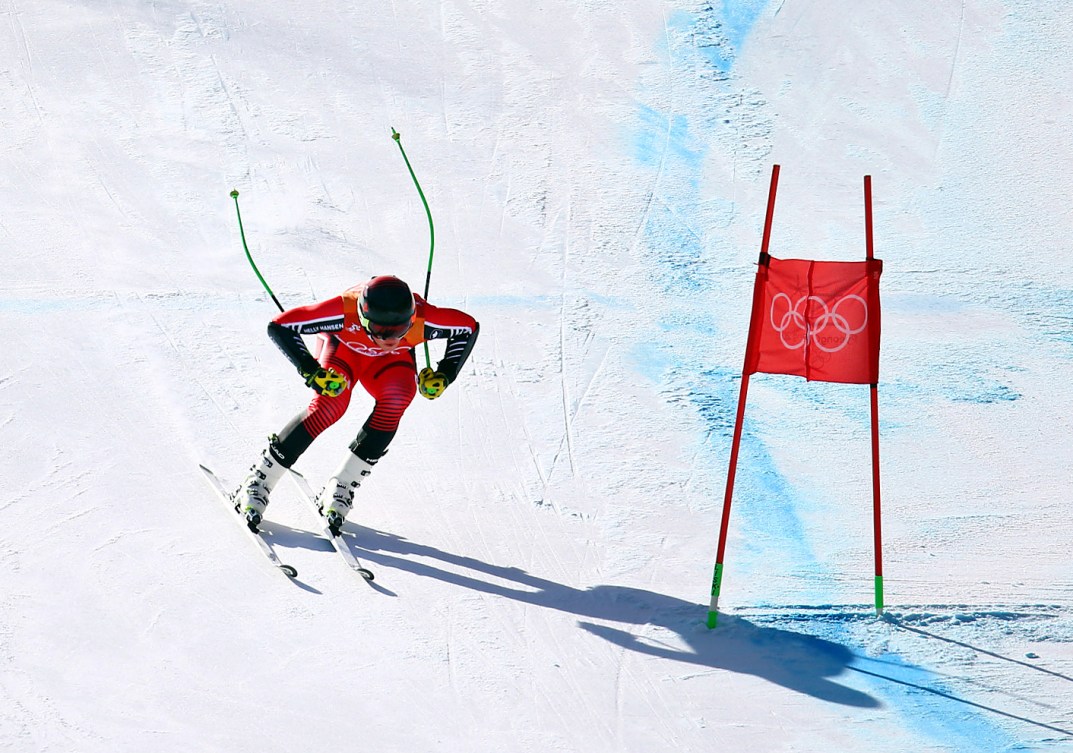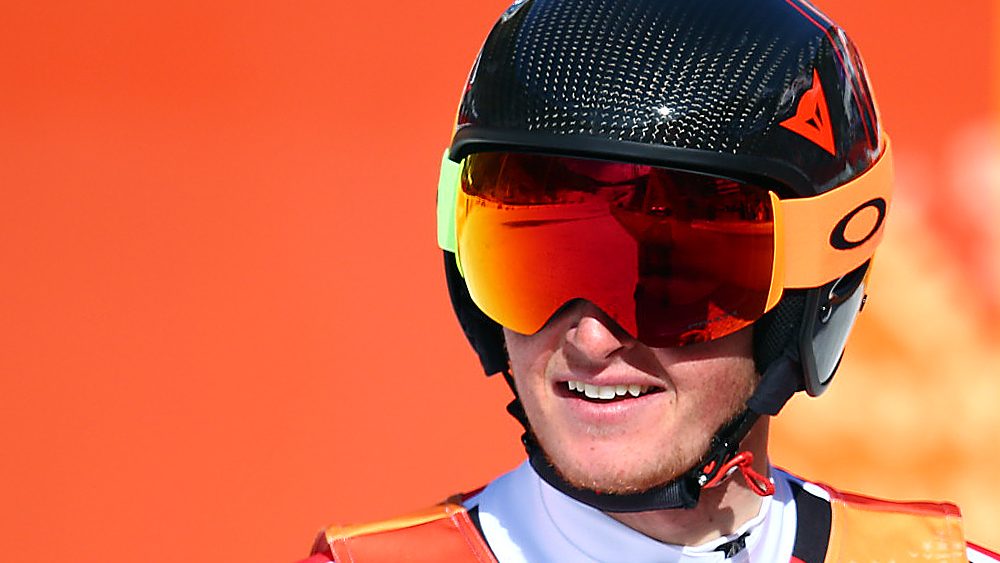“I didn’t want to tell people that life sucked, that I wasn’t good. I didn’t know until I started talking that I needed to talk about it. I needed to feel heard and cared for versus just battling through.”
When two-time Olympian Broderick Thompson speaks, he’s both direct and thoughtful. There’s a sense of determination towards facing an uncertain future that can perhaps only be garnered by a life-altering event, as well as an intense desire for honesty when it comes to sharing his story.
That story starts back when he learned to ski at a young age—a very young age.
“I was born in April and I started skiing the next April,” Thompson said with a chuckle. “It’s been a big family sport that we’ve always done.”
It was by no means the only sport that the athlete hailing from Whistler, B.C. participated in growing up. He also figure skated, and played baseball, volleyball, and soccer.
“My dad was a teacher, so growing up it was always about doing your best.”
Though alpine skiing became his focus, it was not the sport that first spurred his Olympic dreams.

“I have a drawing that I did in kindergarten of me on the Olympic podium…for figure skating.” Thompson said. “So I guess from a pretty young age I wanted to be an Olympian. But as a kid, it’s a dream, you know. I didn’t really get it. Beyond the success in sport, there’s so much else that has to line up as far as timeline and age and health to get to an Olympics.”
Thompson made his World Cup debut in 2014 and his Olympic debut at PyeongChang 2018, where he competed in the super-G, downhill, and alpine combined. He earned his first career World Cup podium in 2021, a huge highlight after a long recovery from a nasty knee injury. His second Olympic appearance, at Beijing 2022, was highlighted by an eighth place finish in the alpine combined.
Even in the earlier stages of his career, Thompson had a keen awareness that nothing can be taken for granted.
“It wasn’t until I stepped into the start gate of an Olympic race that I thought I was an Olympian. I never counted my chickens before they hatched, until I was there.”

On November 29, 2023, life changed dramatically for Thompson. On the same Beaver Creek course in Colorado where he’d had his World Cup breakthrough two years earlier, Thompson crashed during a downhill training run, sustaining both a traumatic brain injury and severe spinal injury. He doesn’t remember the crash, or anything until two weeks afterwards. When he became lucid, he couldn’t recall anything that happened in the year leading up to the accident.
Thompson’s first memory from the aftermath is a doctor saying that they’d never seen someone with those injuries who hadn’t become a quadriplegic. His recovery outcomes were uncertain, both physically and cognitively.
In the months following, Thompson underwent rigorous rehab. Through pictures and stories, he was able to reconnect with many of his memories. He regained the ability to walk, to drive, and surprised medical staff with the speed of his recovery.
But as any athlete knows, the experience of injury goes far beyond the realm of physical health, and into that of mental health. Thompson had to face doctors telling him that he should never ski again.
“I’ve been working at this for 20 years. I was trying to be a world champion, Olympic medallist, World Cup medallist. And at 30 years old, I was told: ‘This is it, you’re done.’”
It was a world-tilting experience for someone who has dedicated themselves to a pursuit. Thompson had pictured that at 30, he’d be coming into the prime of his skiing career, not facing the possibility of its end.
View this post on Instagram
In terms of his age and tenure on the national team, Thompson is sandwiched between two great generations in Canadian men’s alpine skiing. When he first joined the program, the “Canadian Cowboys” were at the peak of their success. Once that generation retired, Thompson became the veteran athlete among the next generation, who have launched their own era of excellence.
In many ways, it was easier for Thompson to connect with retired teammates such as Erik Guay, Manny Osborne-Paradis, and Jan Hudec after his crash, because they could offer perspective on what it means and feels like to be done skiing at an elite level—though Thompson is clear he has not made an official decision either way. They were fully supportive in celebrating what Thompson had accomplished, while leaving behind any “could-have-been” scenarios.
But Thompson also appreciates the mindset of his younger teammates who were on the hill the day of his crash. They have more of an assumption that he will make his way back to them and some of the most famed slopes in the world. It helps keep him optimistic about the steps he’s taking.
He understands that their perspective may come in part from a need to insulate themselves from the trauma of his crash as they continue to race at those same speeds and on the same kind of terrain where he almost lost his life. And Thompson didn’t want them thinking about what happened to him every time they pushed out of a start gate. Alpine skiing is already a sport that requires such mental focus and risk assessment; he didn’t want his own experience adding another layer of stress on them.
“I didn’t want them to be there [for me after the crash], which is a crazy thing to say,” Thompson revealed.
Over the last year, Thompson has had to unlearn many of the cultural pressures regarding mental health that intersect with sport—including assumptions like he should be able to handle everything on his own, or that telling people about his struggles would place a burden on them.
View this post on Instagram
“I appreciate the perspectives I’ve gained through almost dying, getting another chance, getting another choice in life. In a lot of ways, I’m grateful for them, even though they came at a cost that I don’t fully know yet,” said Thompson. “This year has been something that I would never have expected. The challenges that I was presented with, and the changes in my life—it’s like I was given an honesty that I cherish now.”
Conversely to what he might have believed pre-accident, Thompson now sees asking for help as a sign of great strength, not weakness.
“It’s definitely easy to just say, ‘I’m good.’ But I think being strong enough to say you need help is important,” Thompson said. “In the end, every single person I’ve opened up to has been there for me in one way or another.”
Thompson isn’t sure what the future holds, and he’s embracing that.
“I think it’s important every day to be open to what life gives you. You can’t trust that every day is going to be perfect, and that every day will be a step in the right direction. But it is a step in a direction.”
View this post on Instagram
On November 29, 2024, exactly one year to the day of his crash, Thompson posted a photo of himself skiing on Instagram with perhaps the most understated caption possible: “not much to say :) .”
“I’m excited to take on every step that’s next, whether it’s being open to pushing out of a World Cup start gate again, or trying something different. I’m open to it.”
But the thing that excites him most about the future?
“Making connections with people, and continuing to develop a community I believe in.”
Broderick Thompson has shared his story to advocate for open conversation regarding mental health. On Bell Let’s Talk Day, January 22, join us in supporting youth mental health organizations. Text YOUTH to 45678 to donate $5 to a mental health organization and Bell will match it.
Source: View source


![“To ask for help [is] an act of strength”: Broderick Thompson’s life lesson learned from a life-altering event Post image](https://olympic.ca/wp-content/uploads/2025/01/EN-UP-v3-Steph.png)

:strip_icc()/pic5997498.png)